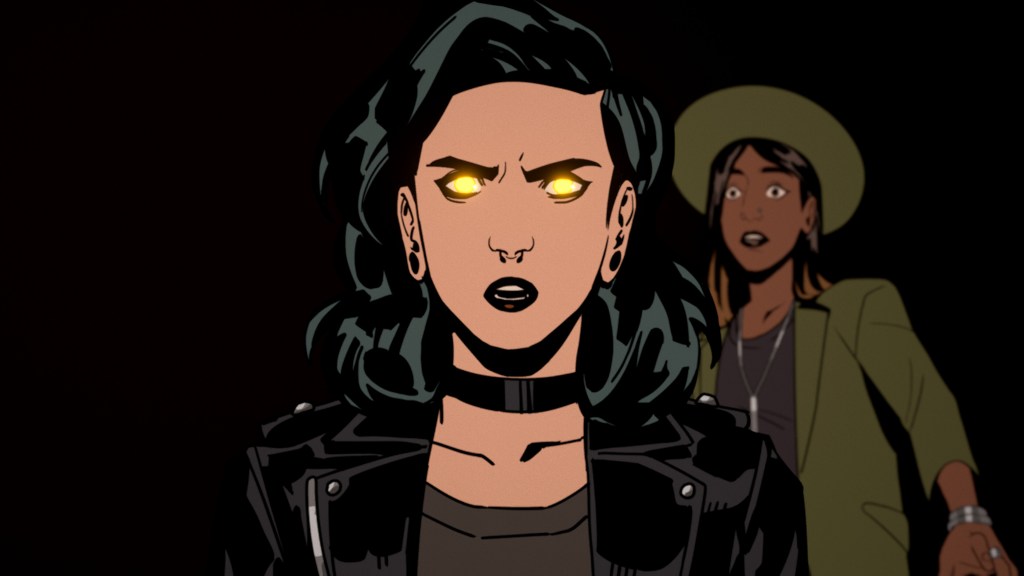Summerfall Studios’ Stray Gods: The Roleplaying Musical is one of the most unique games of the year. Creating a musical is already a colossal undertaking. But turning one into interactive art altered by player choice? Even more daunting. While it doesn’t come together as smoothly as one may hope, there’s enough promise and payoff to make this a successful experiment.
However, Stray Gods doesn’t make a particularly strong first impression. Despite some great character design and art, the lack of actual animation makes exchanges awkward as characters just jump from expression to expression. It’s stuck in an uncomfortable place, where there are a lot more transitions than a standard visual novel, but it never looks actually fluid. Lack of traditional animation isn’t always a bad thing — The Way of the Househusband used a ton of style to turn its limited animation into a strength rather than a weakness — but this becomes an annoyance you get used to rather than a charming quirk.
Things get better once the story kicks into high gear. The story mixes Greek gods with a modern setting — akin to Fables/The Wolf of Among Us — and has a compelling murder mystery at its heart. On top of that, there are a wide array of musical numbers and a cast that features some of the best voice actors around. There’s genuinely a lot to like here once you make it past the offputting lack of animation.
The idea of an interactive musical is quite ambitious and is worth celebrating, even if it doesn’t all totally work as well as you hoped. The music is composed by Austin Wintory of Journey fame (the PS3 game, not the “Don’t Stop Believing” band) and lives up to his high standard. The vocal performances also impress, with Laura Bailey showing that she has a phenomenal singing voice. All the other talent can carry a tune as well — Khary Payton’s Pan and Troy Baker’s Apollo are two particular highlights.
However, the songs don’t fully come together. The lyrics are fine and get the character’s emotions and points across, but they’re not all that catchy or poignant. The world and what characters have to say in Stray Gods’ normal conversations are far more interesting than what is sung. It also doesn’t help that the songs can feel quite disjointed musically due to the interactive element. Players can choose the tone for different sections of a song, which doesn’t always gel.
When not singing, the game is a pretty basic visual novel with some light adventure game elements. You’ll pick locations to go to as you investigate a murder, choose elements to inspect, and who to talk to. The world-building is probably the strongest aspect of the game itself, with the history between characters feeling quite fleshed out. It’s also just fun to see these larger-than-life mythological figures in modern-day settings.
There’s also a lot of replay value here, as the player’s choices impact both the story and the songs. Certain dialogue options are locked behind whatever trait you choose early on. There are romance options to explore, and the character dynamics at play are genuinely interesting. With so much that can change in a run, I want to see how differently the mystery can play out. Stray Gods is definitely a game I’ll wind up giving another playthrough or two as a result.
Stray Gods: The Roleplaying Musical Review: The final verdict
Humble Games’ latest offering is a really interesting artistic experiment. While it didn’t leave me thinking that roleplaying musicals will be the wave of the future, I’m glad Summerfall Studios went for such a wild idea. The end result is uneven yet still quite enjoyable. A compelling mystery is bolstered thanks to some great music and strong performances by its cast. It’s a shame that the animation and songwriting can’t match the quality of the other elements, but Stray Gods: The Roleplaying Musical is still well worth checking out.
-
Great art and an interesting world
-
Austin Wintory's music is lovely
-
Lots of ambition and great performances
-
The lack of animation is jarring at first
-
Lyrics don't always live up to the music
-
Songs can feel disjointed
Disclaimer: Our Stray Gods: The Roleplaying Musical review is based on a PS5 copy provided by the publisher. Reviewed on version 1.001.000.




